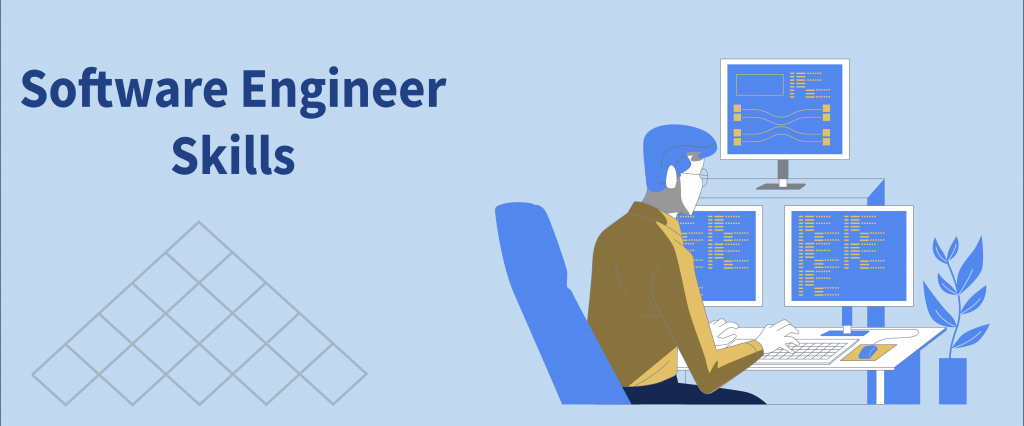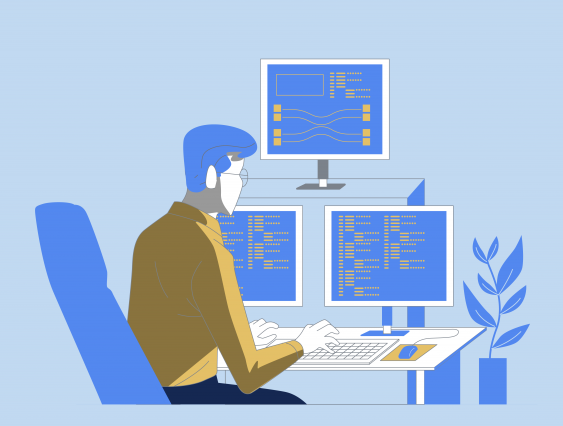The realm of software engineering is experiencing rapid growth and emergence, attracting many with aspirations of becoming esteemed professionals within reputable organizations. The potential for both financial and intellectual success and advancement is substantial within this domain.

This field embodies a blend of stability and dynamism. While one can find reassurance in the industry’s continuous expansion and the abundance of opportunities, it is equally essential to acknowledge the necessity for ongoing learning, problem-solving abilities, and a fervent enthusiasm for swiftly adapting to technological advancements. Given the influx of enthusiastic, talented, and hardworking individuals aspiring to join this field, it becomes imperative for them to understand the skills required to excel as software engineers. This blog aims to explore the top technical skills of software engineers you must know.
Table of Contents
Data Structures and Algorithms
This stands as the quintessential technical skill coveted by all major tech enterprises when considering prospective software engineers. Its significance lies in its capacity to evaluate an individual’s problem-solving prowess, conceptual understanding, and aptitude for innovation and optimization. Initially, mastering a programming language such as C++, Java, or Python is essential, followed by honing problem-solving abilities through the study of data structures and algorithms. Our platform, InterviewBit, offers a conducive environment for learning and practicing programming skills.
Object-Oriented Programming Systems (OOPS)
Proficiency in Object-Oriented Programming (OOP) is indispensable for any software engineer. Most contemporary programming languages adhere to OOP principles like Encapsulation, Polymorphism, Abstraction, and Inheritance. Therefore, it’s imperative that the language chosen for learning data structures and algorithms, or problem-solving in general, be Object-Oriented. While foundational programming courses often begin with languages like C, transitioning to OOP languages like C++, Java, Python, or JavaScript is recommended.
OOP holds immense significance due to its alignment with real-world problem-solving. Objects in OOP represent real-world entities, simplifying the problem-solving process. The four pillars of OOP—Abstraction, Inheritance, Polymorphism, and Encapsulation—enhance functionality for programmers, making it an essential skill for software engineers.
Databases and DBMS
A thorough understanding of Database Management Systems (DBMS) is paramount for aspiring software engineers. As a core Computer Science subject, DBMS knowledge is crucial as virtually all organizational data is stored in databases. Additionally, most software projects necessitate familiarity with database principles. While specific database knowledge is flexible, proficiency in SQL is generally expected. Understanding concepts such as Normalization, ACID properties, Transactions, and deadlocks is equally vital.
Operating System (OS)
Operating System (OS) knowledge constitutes another core Computer Science discipline crucial for software engineers. Mastery of OS concepts enables engineers to develop memory and CPU/process efficient code. Since interaction with OS occurs daily, understanding OS processes, multithreading, and locks is imperative. Familiarity with Linux OS is particularly beneficial, given its prevalence in software development.
Development
Development skills encompass various disciplines such as website development, Android development, or game development. Engaging in development projects provides valuable insight into the software development process and aids in discerning individual interests. Building and deploying websites/apps/games not only offers practical experience but also showcases the ability to learn new concepts and dedication to product development.
Final Thoughts
We’ve covered the essential technical skills necessary for a software engineer. Nevertheless, Software Engineering remains a dynamic and constantly evolving domain. Skills deemed crucial today may lose relevance in the coming years. Hence, the paramount skill for a software engineer’s longevity in the industry is the unwavering commitment to continuous learning and the agility to swiftly adapt to evolving trends and technologies.






